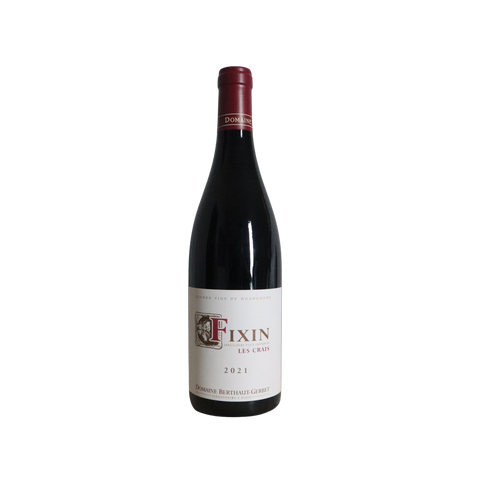
2022 Domaine Berthaut-Gerbet Fixin "Les Crais", Burgundy, France
Wafting from the glass with aromas of blackberries, cassis, iodine and dark chocolate. On the palate, it's medium to full-bodied, ample and fleshy, with a lavish attack, a succulent core of expressive fruit and a melting but stony finish.
ABOUT THIS WINE
Les Crais is 1.73 hectares (4.27 acres). It lies just east of the village, on the lower, very gentle part of the slope, at 280-meters elevation. It faces east-southeast.
The soil is medium-deep, approximately 70 cm. It is brown, light, with a well-draining mixture of silt, sand, clay, and it is very rocky, with up to 40% rounded alluvial gravel and cobbles, and even the occasional large (10-25 cm), rounded boulder. Amélie notes that Les Crais is the easiest of her Fixin vineyards to work, which underlines how well-draining the soil is.
After hand harvest and sorting the vinification uses 20% whole cluster, mostly pump-overs with some punch-downs, indigenous yeast fermentation in tank. Aged for 15 months in barrel (20% new oak).
ABOUT THIS PRODUCER
The Berthauts were once to Fixin what the Rossignols are to Volnay and the Mugnerets to Vosne. In 1896, Danguy and Aubertin listed no less than a dozen Berthauts (and Berthauds) as proprietors in twenty-three lieux-dits in the village. The list includes François Berthaut, Amélie’s great-great-great grandfather, as proprietor in Le Rosier and Combe Lavaux. It is likely that the first vineyards were purchased by François’ father, also named François. Here is the succession as far back as the family can trace it: François Berthaut (1780-1873), François Berthaut (1811-1898), Firmin Berthaut (1845-1920), Bernard Berthaut (1879-1913).
Guy Berthaut, Amélie’s grandfather, was born in 1912 and took over the family domaine in 1930. He started bottling at the domaine right after WWII and entered into leases on some of the vineyards in Gevrey-Chambertin that belong to the Mercier family of the Domaine des Chezeaux. The Berthauts still farm these parcels today.
Guy’s two sons took over in 1974. They worked closely together, sharing the work in the vineyards and the cellar equally, with Denis, Amélie's father, taking on more of the administration and sales of the trade, while his brother, Vincent, tended to sales to private customers. Vincent retired in 2006.
In the 1990s, critics wrote that the domaine was very good. “Less well-known than the two powerhouse landowners, domaines Gelin and Joliet, Domaine Berthaut is among the best in the district,” writes Matt Kramer. They also pointed to the wines’ great age-worthiness, but mentioned a prominent austerity in their youth.
Denis and Vincent Berthaut distrusted new oak and liked longer-than-fashionable aging in used oak. And because they had to work in several small cellars rather than a large one, some wines were racked into barrel or foudres after malolactic fermentation. This combination caused the wines to shut down for a long time. It didn’t matter to people who liked to cellar wines and the Berthauts enjoyed a loyal following among private customers. But palates were moving towards more fruit-driven wines that could be consumed shortly after bottling, so the domaine never made it big with commercial export or the international press.
Details:
| Grape(s) | Pinot Noir |
| Farming | Organic |
